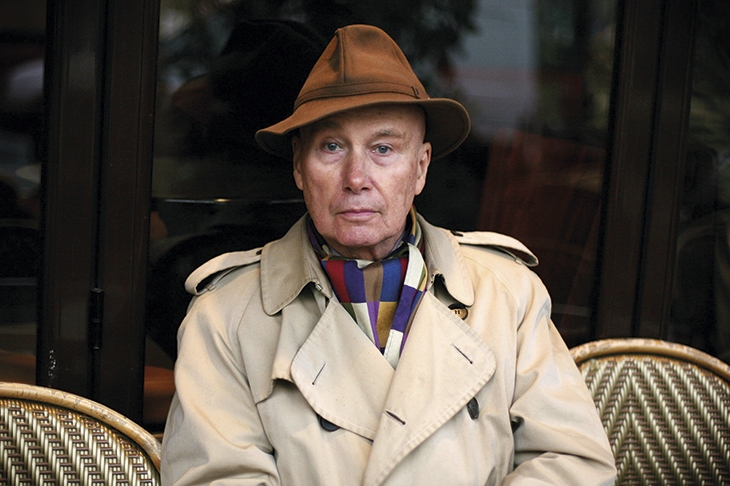Until this book was published, Gabriel Matzneff was a respectable man. The French author may have written about his affairs with young girls and his travels to the Philippines in search of pre-pubescent boys — insert Gallic shrug here — but he still won literary prizes and enjoyed a state stipend. He was celebrated by the chattering classes, who said little when he brought different adolescent girls as his plus one to interviews.
Little V, or V sometimes, was one of those girls. She had slipped in and out of his autofiction for decades. In Consent, her memoir, Vanessa Springora returns the favour and refers to him by his initial. She first met G. at a dinner party in 1986. She was 13, dragged along by her single mother who worked in publishing. He was the guest of honour. He was over 50.
The grooming process she describes was both assiduous and unoriginal. He sent her letters for weeks (her mother was likely to answer the telephone). He started to bump into her in her neighbourhood. He organised a meeting outdoors, then told her that he had afternoon tea ready at his flat. By the second date she thought she was ready to lose her virginity. She had only just turned 14.
Vanessa first met Matzneff at a dinner party. She was 13, dragged along by her single mother. He was over 50
More than a decade before, Matzneff had written what was really a playbook for paedophiles (reprinted as late as 2005). Springora describes how she furnished him with the perfect victim. Her parents were divorced and she was precocious, book- smart, insecure about her looks and hungry for attention — quite ordinary, in other words. Jane Eyre is loved by so many teenage girls for a reason.
‘Consent’, Springora points out, has two meanings. In philosophy it is a response to, or acceptance of, something through ‘an act of free thought’. In law it means the authorisation for marriage given by the parents of a minor. The complete lack of safeguarding is disturbing. Her mother was displeased at first, asking: ‘Are you aware that he’s a paedophile?’ Springora interpreted this as jealousy. But things settled down, and soon the three were having dinner together, playing a twisted version of happy families.
The book evokes a certain time and milieu. The spirit of the 1960s and 1970s still lingered, a period when Roland Barthes, Simone de Beauvoir and Jean-Paul Sartre would sign petitions to lower the age of consent in the name of individual freedom. Springora explains how her mother had grown up in this context, adding this acid observation: ‘And G. was a well-known writer, which made it altogether rather flattering.’
The story has been told before, by Nabokov, among others. But in the past decade Lolita has had her revenge many times. Tiger, Tiger, Excavation, My Dark Vanessa, and most recently Lisa Taddeo’s Three Women are all written from the victim’s perspective. There will be many more of these books — statistics suggest there’s no shortage of would-be authors — and the genre runs the risk of feeling lurid and repetitive. Indeed, authors have accused each other of plagiarism. It’s no shock: however individual the feeling of trauma, these predators have a similar modus operandi.
The suspense in Consent comes from waiting for someone to step in: Springora’s father, a doctor, a family friend, a teacher or the police. But, slowly, she herself began to see through Matzneff. She started to read his books. In them she discovered he had copied out letters he’d received from young girls. He thrived on hiding in plain sight.
Now a respected literary editor, Springora is no puritan; she has no interest in condemning a relationship simply because of an expansive age gap. The word rape is too simple. Her contempt is cool and sardonic and the prose spare. It is his sordid repetitiveness she objects to, and his hypocrisy.
She dismantles the myth of the eccentric genius. He may, for example, have revelled in living in a garret without even a stove, but he was no wild, tormented artist: ‘Bowing to financial necessity, G. published, with the precision of a metronome, one book a year.’
He took something else from her without her consent. He tried to take her identity. Then he insisted on doing her literature homework for her. Now he still writes about her. In Consent she has played him at his own game: ‘Why not ensnare the hunter in his own trap?’
This isn’t a misery memoir, or an account of survival against all odds. It reads like a dark fairy tale, more reminiscent of Jean Rhys’s Wide Sargasso Sea or Kamel Daoud’s The Mersault Investigation, a masterful retelling of Camus’s The Stranger from the Arab’s perspective. Alice has fallen through the looking-glass. I can’t help but cheer her on. Matzneff’s legacy is now enmeshed forever in this clever, thoughtful and honest book.






Comments